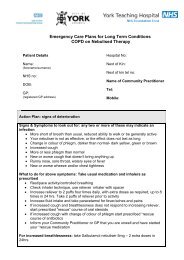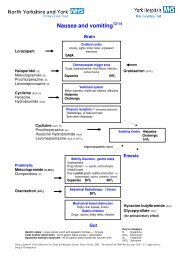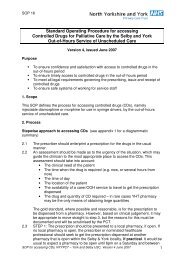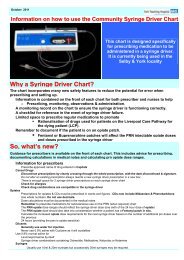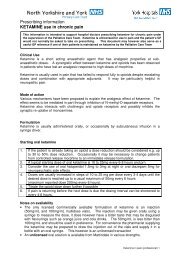Eligibility Criteria for Specialist Palliative Care Services
Eligibility Criteria for Specialist Palliative Care Services
Eligibility Criteria for Specialist Palliative Care Services
Create successful ePaper yourself
Turn your PDF publications into a flip-book with our unique Google optimized e-Paper software.
<strong>Eligibility</strong> <strong>Criteria</strong> <strong>for</strong> <strong>Specialist</strong> <strong>Palliative</strong> <strong>Care</strong> <strong>Services</strong>Summary:<strong>Eligibility</strong> <strong>for</strong> <strong>Specialist</strong> <strong>Palliative</strong> <strong>Care</strong> (SPC) is built on 3 key criteria listed below. Ifa patient fulfils criteria 1 and 2, they will be assessed by a SPC service. If theassessment identifies the need <strong>for</strong> SPC services (criterion 3) then the patient shouldreceive care based on these needs from the local SPC service. It is hoped that thecommissioning process will clarify the responsibilities of SPC services with regard toproviding care.1. The patient has active, progressive and advanced disease.Patients who would be eligible <strong>for</strong> <strong>Specialist</strong> <strong>Palliative</strong> <strong>Care</strong> (SPC) should be thosepatients with active, progressive and advanced disease <strong>for</strong> whom the prognosis islimited (although it may be several years) and the focus of care is quality of life.This definition makes clear that:a. The definition is needs based and not diagnosis basedb. The cornerstone of SPC is improving the quality of life <strong>for</strong> patients who arefacing their own deathc. SPC is largely inappropriate <strong>for</strong> patients with disease that is stable andinactive and who are facing long-term disability rather than death.2. The patient has an unresolved complex need that cannot be met by thecaring team (generalists)Primary health care teams and hospital ward team will continue to provide the bulk ofpalliative care needed by most patients by using the palliative care approach. Thiswhole person approach focuses on quality of life, respect <strong>for</strong> patient autonomy andchoice and encompasses both the dying patient and their family. However, thepalliative care needs of some patients will exceed the resources of the primary careteam and support will be required from a <strong>Specialist</strong> <strong>Palliative</strong> <strong>Care</strong> Service. Thesepatients have an “extra-ordinary” level of need.Complex needs can be patient, carer or health care team centred and the helprequired may be intermittent or continuous depending on the level of need and rate ofdisease progression.Examples of complex levels of need:a) Physical symptoms uncontrolled or complicated symptomsspecialised nursing requirements relatingto mobility, functioning or self careb) Psychological issues uncontrolled anxiety or depressioncognitive or behavioural issues unmet by specialistservicesc) Social issues complex emotional issues involving children, family orcarerscomplex issues relating to physical and humanenvironment
(including home or hospital) or financeissues relating to communications or learning disabilityd) Spiritual issues unresolved issues around self worth, loss of meaningand hope, requests <strong>for</strong> euthanasiaunresolved religious or cultural issuese) Ethical issues help patient / caring team with treatment decisions3. The patient has been assessed by a <strong>Specialist</strong> palliative care (SPC) servicePatients who meet criteria 1 and 2 above can be referred by non specialistprofessionals <strong>for</strong> a SPC assessment. SPC services should make the assessmentprocess as accessible and responsive as possible to patients in need. This willusually be per<strong>for</strong>med by a <strong>Specialist</strong> <strong>Palliative</strong> <strong>Care</strong> nurse or doctor who will bebased in a SPC service. The subsequent level of involvement/intervention, treatmentplan and care package will be negotiated with the patient, carer and referring team.<strong>Care</strong> of patients will be based on a philosophy of shared care with otherprofessionals including primary care teams and hospital teams in oncology,cardiology, elderly medicine, respiratory medicine etc. The degree of input from theSPC service will depend on patients’ need and expertise required to meet that need.It is not always appropriate <strong>for</strong> the SPC services to provide “total care” of patientsparticularly when their primary illness requires significant support from anotherprofessional group.An important feature of the assessment process is that patient needs will be regularlyreviewed to ensure that patients continue to receive care based on their needs. Forexample, as a result of therapeutic intervention or re-investigation a patient may notbe in a phase of “active, progressive and advanced disease” and would not requireongoing SPC services and will be referred back to their original health care team. Itis the responsibility of that team to re-refer patients back to SPC services if the needarises upon regular reassessment.We hope that these eligibility criteria will serve as both entry and exit criteria to SPCservices.Admission <strong>Criteria</strong>The patient has recently been assessed by a member of one of the specialistpalliative care teams.Patients who meet the above criteria may be admitted to any part of the specialistpalliative care service as required.Discharge <strong>Criteria</strong>Patients who no longer meet the above criteria may be discharged from the specialistpalliative care service.Reviewed March 2005 as perYCN <strong>Palliative</strong> care Group



